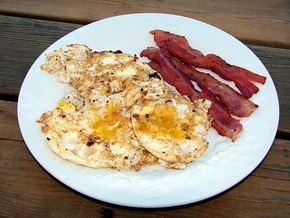Are you still eating carb-heavy, nutrient-light, appetite-stimulating cereal for breakfast? Do you still think eggs are less healthy? Though there is still a strong perception that eggs are bad for the heart and waistline, there is plenty of evidence to show it just isn’t true. A new study from The University of Alberta provides more reason to include eggs as part of a high-quality nutrition plan.
As explained in Medical News Today,[i] researchers found egg yolks to be high in nutrients containing antioxidant properties. They found the tyrosine and tryptophan, the amino acids in egg yolks, to be a great way to boost our bodies’ antioxidants. As the researchers explained, two raw yolks had twice the antioxidant properties of an apple. Though half their antioxidant properties are destroyed through cooking, eggs still provide substantial antioxidant support. The same researchers in a previous study found certain components of eggs acted to lower blood pressure, as well.
Eggs also offer high protein content, as well as iron, zinc, folate, vitamins A, B, D and E, choline, lutein, and zeaxanthin — nutrients that benefit your immune system, heart and eye health — even lower your risk of cancer.
Eggs and Diabetes
The fact that eggs are a healthy food should not come as a surprise, but they’ve been maligned for several years — as a result, many people have cut them from their diets entirely. Those with Type 2 diabetes have been told to reduce egg consumption, yet eggs do not contribute to a greater risk for developing Type 2 diabetes.[ii] It’s possible those who eat eggs in place of breakfast cereals, pastries, bagels or pancakes could be at lower risk because they’re not overloading their system with carbohydrates. Although I have not seen research comparing this scenario, it makes sense based on how diabetes develops.
Eggs and Heart Disease
Don’t eggs increase the risk of heart disease? This theory came from the idea that eating saturated fat and dietary cholesterol increases the risk of atherosclerosis and other heart diseases. Research over the last decade confirms that dietary cholesterol appears to have little, if any effect on blood cholesterol, and there’s no evidence to show saturated fat consumption increases the risk of heart disease, so avoiding eggs for this reason doesn’t make much sense.
Eggs and Weight Gain
Okay, so eggs don’t cause health problems, but they still have plenty of fat in the yolk, so you should still concern yourself with the stuff in the middle, right? Well, if you throw out the yolk, you discard the most nutritious part of the egg. And you still might do it, if you think a low-fat diet is the answer to sustained weight loss. However, we’ve discussed the flaws of a low-fat diet for long-term weigh loss in many articles. Truth be told, eating the yolk along with the white will likely reduce cravings for other food later in the day.
Shopping for Eggs
A last note on egg selection. The study mentioned at the beginning of this article was made using conventional eggs, from chickens fed corn and wheat, which is not their natural diet. If possible, choose eggs from pasture-raised chickens. These will have the best nutrition profile.
Summary
I can’t remember the last time I ate cereal, pancakes or bagels for breakfast. I know the importance of starting the day with a high-protein, nutrient rich breakfast. Most mornings that includes egg, such as scrambled eggs, an omelet with vegetables or eggs sunny-side up. There is an endless variety of ways to make them and they’re economical. Try starting your day with a few eggs and you’ll likely notice a significant difference in how you feel, in terms of energy and satiety —and your weight may even come down a bit.
References
[i] University of Alberta. Eggs May Help Prevent Heart Disease and Cancer. Medical News Today. 07 Jul 2011.http://www.medicalnewstoday.com/releases/230604.php
[ii] Djousse Luc, Kamineni A, Nelson TL, et al. Egg consumption and risk of type 2 diabetes in older adults. Am J Clin Nutr. 2010;92(2):422-427
This post was co-authored by my handsome husband. Tom is the Director of Nutrition & Weight Management for Life Time Fitness and Life Time Weight Loss